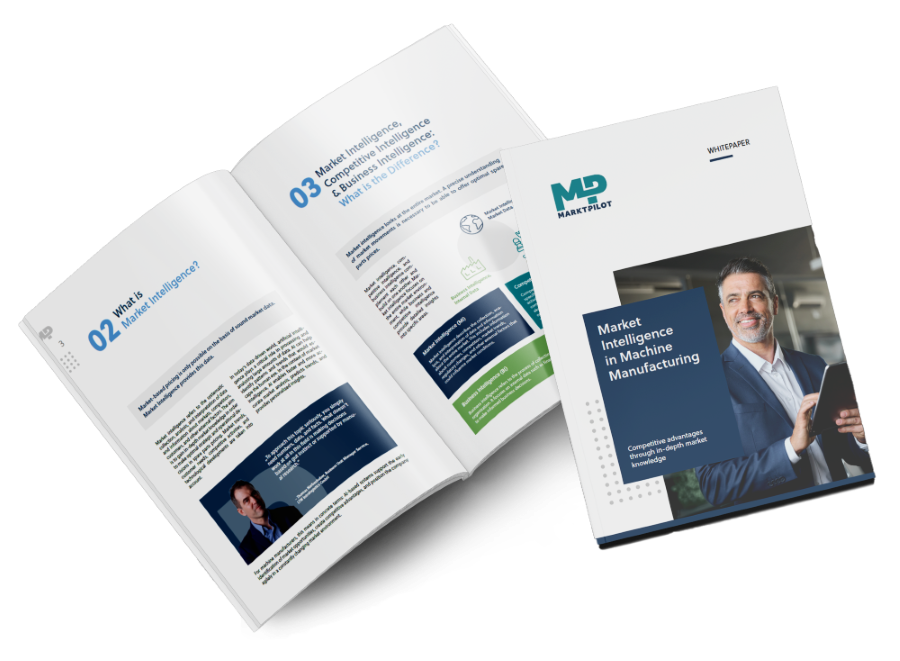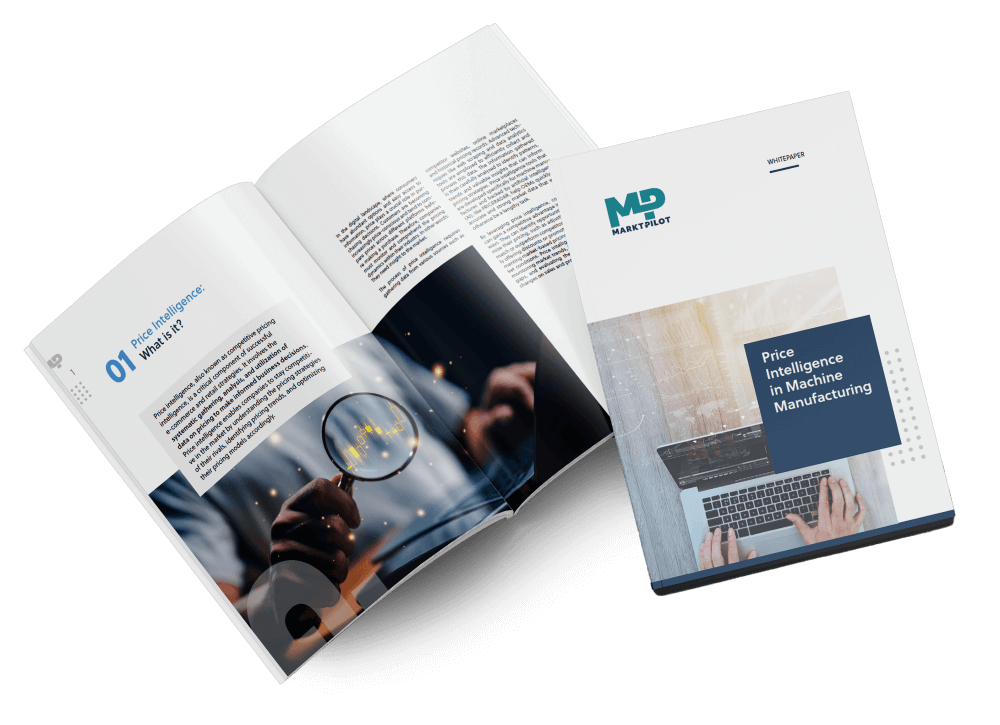AI in the Machine Manufacturing: Gearing Up for a Smart Revolution
Discover how artificial intelligence is transforming the machine manufacturing industry. The webinar review shows innovative ways of digital...
Discover how Artificial Intelligence is transforming machine manufacturing, driving efficiency, revenue growth, and precision. From predictive maintenance to AI-powered pricing, explore real-world applications and learn how to successfully integrate AI into your operations with our essential checklist.
At its core, Artificial Intelligence (AI) represents the ability of machines to take on tasks that traditionally require human thinking and decision-making. AI manufacturing solutions have evolved from a futuristic concept into a practical reality, transforming the entire production process.
Traditional automation solutions, used in industrial manufacturing for decades, rely on pre-programmed instructions. Machines execute predefined tasks with high precision but reach their limits when unforeseen problems or variations occur. This is where AI comes in. Through the use of machine learning and deep learning algorithms, modern systems can learn from past experiences, identify patterns, and make decisions independently based on these insights.
Industrial robots, which were traditionally programmed for repetitive tasks, are now capable of handling complex, non-linear tasks. Thanks to AI, they can autonomously identify, grasp, and integrate various objects into production processes without needing every scenario to be explicitly programmed in advance. These AI manufacturing solutions bring unprecedented levels of flexibility and adaptability to modern manufacturing.
Ai in machine manufacturing incorporates technologies such as machine learning and deep learning, which fuel AI-powered business intelligence. These technologies lay the groundwork for recognizing patterns in large datasets and making informed predictions to improve operations.
… is a subset of AI that focuses on developing algorithms that can improve themselves using experience and data. In manufacturing, machine learning is used to optimize production processes by identifying patterns in production data and using them to enhance workflow efficiency. For example, machines can learn to automatically adjust their own parameters to enhance production efficiency and reduce energy usage.
… goes one step further by using complex neural networks capable of recognizing deeper patterns in large datasets. This enables systems to generate precise predictions or make decisions that would have previously required human intervention. A typical example of deep learning in manufacturing is predicting machine breakdowns using sensor and production data.
The adoption of AI solutions in manufacturing represents a fundamental shift, extending far beyond traditional automation. AI has the power to enhance nearly all areas of production by delivering deeper insights, quicker response times, and unparalleled efficiency. In modern manufacturing industry, AI plays a pivotal role, transforming the way companies manage their production operations.
AI solutions range from optimizing production lines to fully automating complex manufacturing processes. A key feature of AI is its capacity to analyze enormous data sets and extract meaningful insights. This data, sourced from sensors, machinery, and production systems, is processed in real time, enabling immediate adjustments and improvements.
AI’s significance cannot be emphasized enough. By utilizing machine learning to streamline processes and making decisions based on data analysis, businesses can start to lower production costs, enhance quality, and optimize supply chain efficiency. In a competitive market where speed and accuracy are key to success, AI offers a significant competitive edge. This applies across various fields, such as management, maintenance, and pricing.
20% Increase in Supply Chain Efficiency
By optimizing processes, automating tasks, and improving forecasting accuracy, companies can boost the efficiency of their supply chains by up to 20%, leading to substantial cost reductions and increased market competitiveness.
Predictive maintenance is one of the most promising AI applications in machine manufacturing and a key revenue driver in the after-sales sector. Traditionally, machines are maintained at fixed intervals, often leading to unnecessary downtime or, in the worst-case scenario, unforeseen failures. AI allows maintenance to be carried out precisely when it is required.
By using IoT sensors that continuously collect data on machine conditions and AI algorithms that analyze this data in near real-time, potential failures can be detected early. This allows for predictive maintenance planning, increasing machine availability and reducing maintenance costs. Companies like Siemens and GE have already successfully implemented predictive maintenance to maximize the reliability of their machines while minimizing operational costs.
AI offers a transformative approach to pricing in the machine manufacturing industry. By leveraging AI to analyze market trends, production expenses, and other key data, companies can adjust pricing for their entire parts inventory according to market data. This enables businesses to respond more quickly to market changes while maximizing profitability.
For instance the product solutions from MARKT-PILOT offer AI-supported market-based pricing intelligence to optimize the entire parts portfolio. It enables the identification of growth opportunities and the rapid and precise implementation of price changes across thousands of parts. This shows how AI in machine manufacturing not only improves processes but also specifically leads to increased revenue in the parts business.

In our whitepaper Market Intelligence in Machine Manufacturing, you will learn everything about market intelligence and the role AI plays in using market data in machine manufacturing, particularly in the aftermarket and parts pricing.
Artificial Intelligence in machine manufacturing is no longer a vision of the future, even though it often still appears that way. In fact, AI solutions already play a crucial role today in optimizing processes at various levels. Many companies worldwide have successfully integrated AI into their operations, particularly in manufacturing, setting new benchmarks for innovation and efficiency.
In machine manufacturing, this means that AI systems can collect data from various sources, analyze it, and make independent decisions based on it. The use of these solutions not only offers potential for process optimization and automation but also ensures long-term competitiveness in the competitive mechanical engineering industry.
These five companies are considered global pioneers in the development and application of AI solutions.
The effectiveness of artificial intelligence in the machine manufacturing sector is closely tied to the quality of the data it uses. AI systems need vast amounts of data to learn and generate precise predictions. If the data is not high quality, there is a potential risk that the AI may deliver incorrect or inconsistent results.
For successful AI implementation in machine manufacturing, identifying relevant data sources is essential. This includes sensor data, production histories, and supply chain information. This data must not only be available in sufficient quantity but also of high quality. Preparing and cleansing the data is a vital step to ensure that AI models work with reliable information.
In addition to data quality, the continuous availability and accessibility of data are also crucial. By leveraging IoT technologies and edge computing, companies can ensure that relevant data is captured and processed in real time. One challenge is data silos. These can be avoided by integrating and harmonizing data from various departments and systems. This creates a comprehensive overview of production processes, ultimately improving the decision-making process with the help of AI.
Selecting the appropriate AI systems is a crucial step toward the successful implementation of AI in machine manufacturing. It’s important to find a solution that not only addresses the company’s present needs but is also able to scale and be ready for future developments.
First, it’s essential to identify the specific needs of the company. What problems should be solved through the use of AI? In which areas of production or management is there potential for optimization? These questions are key to defining the requirements for an AI solution. At the same time, an evaluation of internal capacities should be conducted to determine if the company has the necessary expertise and infrastructure to successfully implement AI.
The solution must be able to seamlessly integrate with existing systems and processes. It is important that it is compatible with the existing IT infrastructures and does not require extensive changes or adjustments.
The solution must be adaptable to changing production conditions and business requirements. It should be capable of handling larger data sets and meeting higher performance requirements as they grow.
The solution should be easy to use and intuitively understandable. A complex user interface or extensive training can lead to lower acceptance and usage of the solution.
Since AI solutions often process sensitive data, it is essential to implement strict data protection and security measures. There should be clear guidelines for handling data and mechanisms to ensure data security.
An AI solution is only as good as its support team. It's important to ensure that the provider has a competent and reliable support team available quickly for any issues or questions.
The costs of the solution must be carefully evaluated. It's important to consider the total costs over the entire lifecycle, including implementation, maintenance, and potential upgrades. While a high-quality AI solution may initially be more expensive, it often provides higher profitability in the long run.
These criteria help ensure that the chosen AI solution not only meets current needs but also provides long-term value. It is important to consider the solution not in isolation, but in connection with existing IT systems and the future business strategy. Only in this way can it be ensured that the AI solution is a meaningful addition to the overall strategy of the company.

In our whitepaper Price Intelligence in Machine Manufacturing, you'll gain necessary knowledge and insights related to price intelligence. Learn how to use AI solutions to make pricing in the parts business even more effective and profitable.
Once an AI solution is in place, it is essential to evaluate the success and return on investment (ROI). This requires identifying and regularly tracking relevant key performance indicators (KPIs).
Key KPIs for AI implementation typically include productivity metrics that capture efficiency improvements enabled by AI, as well as quality assurance metrics that show how AI enhances product quality and reduces defects. Maintenance efficiency can also be assessed by evaluating the savings and improvements achieved through predictive maintenance.
When evaluating the ROI of an AI implementation, it is essential to perform a thorough cost-benefit analysis. This process compares the costs of implementation with the savings and productivity improvements generated by AI. In addition to short-term effects, long-term impacts of AI implementation should also be considered to get a complete picture of profitability.


Customer Success Story: LTW Intralogistics GmbH
THE CHALLENGE
Static price lists and reactive price adjustments no longer meet current market demands, which is why the traditional cost-plus logic needs to be rethought. Especially in dynamic and volatile times, one of the greatest challenges in the service sector is meeting the continuously changing customer requirements.
Thomas Narbeshuber, Business Unit Manager Service at LTW Intralogistics GmbH, aptly summarizes the current situation in service: "The challenge in after sales is to meet the constantly changing requirements of customers as a logistics supplier, especially in increasingly dynamic and volatile times." But how can these processes be made more efficient and profitable?
INNOVATIVE PRICING STRATEGIES TO FOSTER TRUST
The solution? To maintain competitiveness, an intelligent pricing strategy is imperative. This entails creating a simple pricing model seamlessly integrated into existing processes and easily maintained.
With the implementation of MARKT-PILOT, LTW Intralogistics has adopted a lean and scalable solution, positioning the company as a fair and reliable partner for its customers in terms of both availability and prices.The software's swift deployment without the need for extensive implementation enables a quick start.
The integration of AI-powered business intelligence into machine manufacturing opens up numerous possibilities for process optimization, automation, and efficiency improvements. AI helps businesses automate complex workflows and streamline their manufacturing operations, leading to a significant competitive advantage.
In addition, AI enables precise, data-driven pricing strategies, making it easier for companies to adapt to dynamic market changes and increase their profitability. By turning data into actionable insights, AI promotes strategic growth and supports informed decision-making. These benefits make businesses more efficient, agile, and competitive, which is particularly valuable in today’s increasingly demanding market environment.
Investing in AI technologies is therefore not only a step toward modernization but also a strategic advantage that positions companies for long-term success.
Artificial Intelligence in machine manufacturing involves the use of algorithms and machine learning to automate processes, analyze data, and make informed decisions. Examples include predictive maintenance, quality control, and process optimization.
AI increases efficiency, reduces downtime, and optimizes use of resources. Machine manufacturers can gain a competitive advantage, lower production costs, and enhance their innovation capabilities with AI.
AI uses data from sensors, IoT devices, and production systems to identify patterns and make data-driven decisions. For example, machines can autonomously detect errors or suggest process enhancements. Maintenance and service around the machines can be improved.
The key advantages of AI in machine manufacturing include:
In machine manufacturing, AI is typically used successfully in the following areas:
Machine manufacturers, suppliers, and customers all gain advantages. Companies enjoy increased efficiency and cost savings, while customers benefit from more reliable products and improved service.
AI in machine manufacturing makes sense when companies:
Discover how artificial intelligence is transforming the machine manufacturing industry. The webinar review shows innovative ways of digital...
The industry conference for aftermarket and pricing in machine manufacturing professionals is gearing up for its 2025 event.
Following Trump's announcements of sweeping global tariffs, a historic trade war is imminent in 2025. Read now how your business can remain...